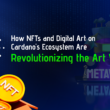On April 22nd, 2024 the Cardano Foundation announced the creation of Pragma. A new member-based, open source, not-for-profit association alongside Blink Labs, Dcspark, Sundae Labs and TxPipe all of which are renowned for their expertise in IT development and engineering within the Cardano network. The five organizations (including CF) aim to foster an alternative open-source ecosystem for Cardano and other blockchains.
The primary objective of PRAGMA is to cultivate an open-source environment conducive to the growth and evolution of blockchain technology. By providing a platform for hosting existing projects and facilitating the development of new ones, PRAGMA aims to empower developers to unleash their creativity and contribute to the advancement of the Cardano ecosystem.
Sebastian Bode, Director of Engineering at the Cardano Foundation and Board Member of PRAGMA, expressed his enthusiasm for the association’s mission, stating, “PRAGMA represents an important step forward in the Cardano Foundation’s mission to support Cardano becoming a public infrastructure. Together, we are a team of passionate software engineers from various backgrounds who build open-source tools for developers aiming for mass adoption of blockchain.”
Frederik Gregaard, CEO of the Cardano Foundation, echoed Bode’s sentiments, emphasizing the significance of PRAGMA in advancing the open-source maturity of the Cardano ecosystem. “At the Cardano Foundation, we are advocates for collaborative initiatives that increase the diversity, quality, and quantity of blockchain solutions,” Gregaard remarked. “PRAGMA represents a significant milestone on this path.”
Amaru
At the forefront of PRAGMA’s agenda is the promotion of interoperability and innovation within the Cardano network. One of its flagship projects, Amaru, seeks to develop a Cardano full node in Rust, offering seamless compatibility with existing Haskell nodes. This initiative underscores PRAGMA’s commitment to fostering a diverse and resilient ecosystem capable of supporting a wide range of applications and use cases.
Amaru represents a bold step towards enhancing the decentralization of the Cardano platform by offering a novel approach to node infrastructure. Unlike traditional Haskell nodes, which have long served as the backbone of the Cardano network, Amaru aims to provide a full block-producing node written in Rust. This ambitious undertaking not only diversifies the technological landscape of Cardano but also lays the foundation for a more inclusive and resilient ecosystem.
Central to the vision of Amaru is its goal to achieve interoperability with existing Haskell nodes, allowing it to seamlessly coexist within the Cardano network. By running side-by-side with Haskell nodes, Amaru not only expands the platform’s capacity but also reinforces its commitment to decentralization.
The development of Amaru is a multifaceted endeavor that encompasses various disciplines, including networking, cryptography, and language theory. Through a modular approach, the project tackles each aspect of the node and its surrounding ecosystem, ensuring a comprehensive and robust solution.
In addition to its technical prowess, Amaru prioritizes developer experience, aiming to provide intuitive interfaces using widely adopted technologies such as gRPC. By embracing industry standards and compatibility with existing Cardano middlewares like Ogmios and Oura, Amaru streamlines the development process and fosters innovation within the ecosystem.
At its core, Amaru serves as a foundational component for decentralized applications building on the Cardano blockchain. While it does not participate in the consensus mechanism or propagate blocks on the network, Amaru fulfills a crucial role as a trusted source of data for client applications. By synchronizing the chain from trusted peers and serving data through an API query layer, Amaru empowers developers to create innovative applications that leverage the full potential of the Cardano network.
Aiken
Another key project spearheaded by PRAGMA is Aiken, a smart contract platform designed to streamline and enhance the development of smart contracts on Cardano. By simplifying the process of creating and deploying smart contracts, Aiken aims to lower barriers to entry for developers and accelerate the adoption of blockchain technology across various industries.
In the dynamic landscape of blockchain technology, smart contracts play a pivotal role in enabling a wide range of decentralized applications. Recognizing the need for a modern and accessible programming language tailored specifically for smart contract development on Cardano, the community has embraced Aiken as a groundbreaking solution that simplifies and enhances the smart contract development process.
Aiken stands out as a testament to the collaborative spirit of open-source development, with its origins rooted in the dedicated efforts of passionate individuals. Supported initially by TxPipe, Aiken gained momentum with the backing of the Cardano Foundation, which recognized its potential to catalyze growth within the Cardano ecosystem. Since its inception, Aiken has rapidly emerged as one of the most beloved frameworks for building smart contracts on Cardano, attracting a diverse community of developers eager to harness its capabilities.
At its core, Aiken embodies simplicity and accessibility, boasting an easy-to-learn syntax designed to facilitate seamless integration with other tools and languages. Its intuitive design empowers developers of all skill levels to rapidly prototype and deploy smart contracts, thereby lowering barriers to entry and fostering innovation within the ecosystem.
Despite its stability, Aiken remains committed to continuous improvement, with its ecosystem of tools evolving and reshaping to enhance the developer experience. With over 40 code contributors and a vibrant community providing feedback and ideas, Aiken thrives as a collaborative effort that embodies the core principles of open-source development.
As one of the first projects hosted under PRAGMA, Aiken exemplifies the ethos of collaboration and innovation championed by the association. By providing a platform for the continued growth and development of Aiken, PRAGMA reaffirms its commitment to fostering an open and inclusive ecosystem that empowers developers to realize their creative vision.
In the ever-evolving landscape of blockchain technology, Aiken stands as a beacon of innovation, empowering developers to unlock the full potential of smart contracts on the Cardano platform. With its user-friendly interface, robust feature set, and vibrant community support, Aiken paves the way for a new era of decentralized applications built on Cardano.
Conversation with Blink Labs
Q1: Blink Labs has been working and contributing to several projects written in Go programming language. However, Amaru and Aiken are projects based on the Rust programming language. What are the advantages and disadvantages of choosing one over the other?
A1: Blink Labs will continue to focus on Go as a language and will be providing infrastructure services and support, including custom tooling. We will utilize Go to build test frameworks and node automation. Rust has a larger community within Cardano and the other PRAGMA teams have the collective backgrounds and experience to succeed. It has the momentum to be a first target.
Q2: Blink Labs is also part of Cardano Blockchain Infrastructure Alliance, Armada Alliance and UTxO RPC. How does the involvement in Pragma help expand Blink Labs efforts in the Cardano ecosystem?
A2: PRAGMA gives us a place to house collaborative projects under a shared ownership model where there is a known umbrella organization. Focus is on Aiken and Amaru and getting our processes worked out and repeatable. After that, we start bringing in additional projects. Our goal is long term sustainability for open source.
Q3: With Blink Labs expertise in the Go programming language, can we expect a future project of developing a Cardano full node in Go?
A3: Maybe. https://github.com/blinklabs-io/node
We made the repository public during our workshop at Buidler Fest. We’re going to try to keep up with Amaru while also working on our own implementation in Go.
Q4: How will Pragma help Cardano become a more diversified and resilient blockchain? Which role will Blink Labs play in this effort?
A4: PRAGMA builds a second body with a different consensus model and limited scope. It’s tightly focused on open source software development and sustainability. It provides an alternative and parallel engineering environment to Intersect. Aiken is popular, but still in its early stages while Amaru is in its infancy. It will be a sprint to get to near feature parity with the current Intersect offerings. From there, we are eager to see how the two organizations can collaborate on an ongoing basis.










